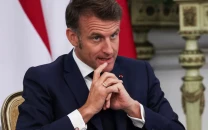Alleged US spy received Russian 'state secret' without knowing, says lawyer
Moscow rejected the idea Whelan could be exchanged for any US prisoner

Former US marine Paul Whelan appeared in a glass cage at the court hearing as is usual for suspects in Russia. PHOTO: AFP
Paul Whelan, 48, was taken into custody on December 28 by the Russian FSB security service, which said he was caught "while carrying out an act of espionage".
His lawyer Vladimir Zherebenkov said Whelan was handed a USB drive containing state secrets but he had thought it was information about Russian culture.
"On a USB drive, Paul received information that... I confirm is a state secret," Zherebenkov told journalists, insisting that Whelan did not know what it contained.
"In reality, Paul was supposed to receive from the person information that is not a state secret," he said, indicating he was expecting to be given cultural material and photographs.
Trump says US to exit landmark nuclear arms pact, Russia threatens retaliation
"He couldn't look at it because he was detained. He was waiting for information that was cultural, nothing more."
The lawyer did not identify the individual who gave Whelan the USB drive.
Wearing a neat blue shirt and dark trousers, Whelan appeared in a glass cage at a hearing at Moscow City Court, as is usual for suspects in custody in Russia. Judge Dmitry Pronyakin threw out his appeal against being detained in custody.
Whelan, who followed the proceedings through an interpreter, did not respond to questions shouted by journalists about his prison conditions. A man wearing plain clothes and a balaclava stood next to the cage in a case led by the FSB.
Zherebenkov said the defence would appeal Tuesday's decision.
"Paul behaved with great dignity today. He spoke well. He explained in detail what happened and in principle contradicted the position of the prosecution," the lawyer said after the hearing, most of which was closed to the press and consular officials.
Analysts have speculated Whelan was arrested to pave the way for a possible spy swap with a Russian agent arrested abroad, but Zherebenkov refused to comment on the possibility.
Russian sought 'synergy' with Trump campaign in 2015: Mueller
Some believe he may have been detained in retaliation for the US arrest of a Russian woman called Maria Butina, a gun rights campaigner who was convicted in December of being a "foreign agent" and likely faces six months in jail.
Moscow has rejected the idea Whelan could be exchanged for any US prisoner, saying it does not treat people as "pawns" in diplomatic games.
Zherebenkov said he expected any trial to last for at least half a year and that there could be no talk of any exchange until it was completed.
Whelan "was clear-headed and sure of himself" at the hearing, the lawyer added. "He says he's a friend of Russia, he has been coming to Russia for 10 years... All these meetings, all these contacts were ordinary, related to the country's culture."
Speaking to the Russian media, the US embassy in Moscow said it was "closely following" the case, with spokeswoman Andrea Kalan calling for "a quick, fair and transparent trial".
US Ambassador Jon Huntsman has visited Whelan at Moscow's Lefortovo prison.
Consular officials from the US, Canada and Britain came to the court and questioned Whelan's lawyer about the conditions of his imprisonment and asked how they could help.
The lawyer said Whelan had a minor health issue and that an interpreter would help him during a doctor's visit.
Whelan's family said he was in Moscow for a friend's wedding and US security experts have raised doubts over whether he was a spy.
He also holds British, Irish and Canadian passports but his family said that the UK and Canadian governments had been denied consular access.
According to The New York Times, the Marine Corps court-martialed Whelan in 2008 on charges of larceny and passing bad cheques, an offence that in most cases disqualifies candidates from foreign intelligence work.
Espionage is punishable in Russia by up to 20 years in jail.






1724148693-0/BeFunky-collage]_____-(24)1724148693-0-208x130.webp)











COMMENTS
Comments are moderated and generally will be posted if they are on-topic and not abusive.
For more information, please see our Comments FAQ